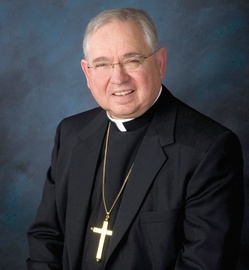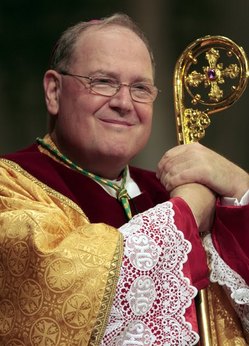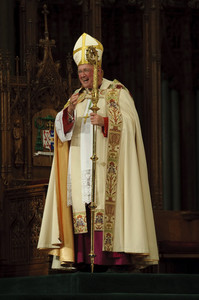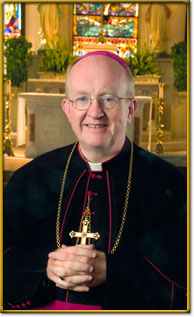 At the general assembly of the US Bishops today, Cardinal Donald Wuerl, Archbishop of Washington, DC, announced the Vatican appointment of Bishop Kevin W. Vann, Bishop of Fort Worth Texas, to be the Ecclesiastical Delegate for the Pastoral Provision (in effect since 1981). Vann succeeds Archbishop John J. Myers of Newark. Vann will oversee the the formation and admittance of former Anglican clergy to the Roman Church. He will work closely with Cardinal Wuerl who has oversight of the temporary church structure of the Anglican Ordinariate in the USA.
At the general assembly of the US Bishops today, Cardinal Donald Wuerl, Archbishop of Washington, DC, announced the Vatican appointment of Bishop Kevin W. Vann, Bishop of Fort Worth Texas, to be the Ecclesiastical Delegate for the Pastoral Provision (in effect since 1981). Vann succeeds Archbishop John J. Myers of Newark. Vann will oversee the the formation and admittance of former Anglican clergy to the Roman Church. He will work closely with Cardinal Wuerl who has oversight of the temporary church structure of the Anglican Ordinariate in the USA.
Tag: USCCB
USCCB Religious Liberty committee and consultants finalized
The USCCB Ad Hoc Committee on Religious Liberty headed up by Bishop William Edward Lori announces the bishops and consultants:
Ten bishops and 10 consultants were named to the committee in early November.
New members are Bishop John O. Barres of Allentown, Pa.; Archbishop Charles J. Chaput of Philadelphia; Bishop Daniel E. Flores of Brownsville, Texas; Archbishop Wilton D. Gregory of Atlanta; Archbishop John C. Nienstedt of St. Paul and
Minneapolis; Bishop Thomas J. Olmsted of Phoenix; Bishop Thomas J. Paprocki of Springfield, Ill.; Archbishop Thomas J. Rodi of Mobile, Ala.; Archbishop J. Peter Sartain of Seattle; and Cardinal Donald W. Wuerl of Washington.
Consultants include Carl Anderson, supreme knight of the Knights of Columbus; attorneys Kevin Baine, Philip Lacovara and L. Martin Nussbaum; Father Raymond J. de Souza, a columnist and priest of the Archdiocese of Kingston, Ontario;
Richard Garnett, associate dean and professor of law and political science at the University of Notre Dame; John Garvey, president of The Catholic University of America; Mary Ann Glendon, Harvard Law School professor; Judge Michael
McConnell, Stanford University Law School professor; and Mary Ellen Russell, executive director of the Maryland Catholic Conference.
Lori said we need to have “a new appreciation for religious liberty and a renewed determination to defend it.”
As mere commentary, the lay members of this committee are impressive.
Claim the Truth of Christ, says Archbishop Dolan in USCCB address November 14, 2011
You can read Archbishop Dolan’s presidential address in its entirety elsewhere; here I offer a few points from the address to reflect upon:
…our most
pressing pastoral challenge today is to reclaim that truth, to restore the
luster, the credibility, the beauty of the Church “ever ancient, ever new,”
renewing her as the face of Jesus, just as He is the face of God. Maybe our
most urgent pastoral priority is to lead our people to see, meet, hear and embrace
anew Jesus in and through His Church.
Because, as the chilling statistics we
cannot ignore tell us, fewer and fewer of our beloved people — to say nothing
about those outside the household of the faith — are convinced that Jesus and
His Church are one. As Father Ronald Rolheiser wonders, we may be living in a
post-ecclesial era, as people seem to prefer
a King but not
the kingdom,
a shepherd with
no flock,
to believe
without belonging,
a spiritual
family with God as my father, as long as I’m
the only child,
“spirituality”
without religion
faith without
the faithful
Christ without
His Church.
Continue reading Claim the Truth of Christ, says Archbishop Dolan in USCCB address November 14, 2011
USCCB’s Committee on Religious Liberty detailed
Since its establishment there’s been little concrete news on the make up of the United States Conference of Catholic Bishops’ Ad Hoc Committee on Religious Liberty. The President of the USCCB, Archbishop Timothy Dolan, established the committee to address the concerns surrounding the reduction of religious freedom in a variety of arenas, not least government and culture. Dolan named Bridgeport Bishop William E. Lori as the chairman, the member bishops and consulters have yet to be named. A group of bishops will meet, however, Sunday, 13 November, in advance of the annual general assembly of the US bishops.
Defending Our First Freedom, Archbishop José Gomez, decries slowly losing sense of religious liberty in America
On 25 October 2011, Los Angelus Archbishop José H. Gomez, STD, 60, spoke on the slow loss of America’s first freedom. On March 1, 2011, Archbishop Gomez became the Archbishop of Los Angelus, after being the Archbishop of San Antonio; he’s been a bishop for nearly 11 years. A stellar article follows:
There is much evidence to suggest that our society no longer values the public role of religion or recognizes the importance of religious freedom as a basic right. As scholars like Harvard’s Mary Ann Glendon and Michael Sandel have observed, our courts and government agencies increasingly treat the right to hold and express religious beliefs as only one of many private lifestyle options. And, they observe, this right is often “trumped” in the face of challenges from competing rights or interests deemed to be more important.
These are among the reasons the U.S. Catholic bishops recently established a new Ad Hoc Committee for Religious Liberty. My brother bishops and I are deeply concerned that believers’ liberties–and the Church’s freedom to carry out her mission–are threatened today, as they never have been before in our country’s history.
Catholics have always believed that we serve our country best as citizens when we are trying to be totally faithful to the teachings of Jesus Christ and his Church. And since before the founding of the American Republic, Catholics–individually and institutionally–have worked with government agencies at all levels to provide vital social services, education, and health care.
But lately, this is becoming harder and harder for us to do. Just last week, the federal government declined a grant request from the U.S. bishops’ Migration and Refugee Services agency. We are not really sure why. No reason was given. Our agency has been working well with the government since 2006 to help thousands of women and children who are victims of human trafficking.
Recently, the government had been demanding that our agency provide abortions, contraception and sterilizations for the women we serve. We hope our application was not denied because we refused to provide these services that are unnecessary and violate our moral principles and religious mission.
And this is not an isolated case. Right now, the federal government is also trying to force private employers to provide insurance coverage for sterilizations and contraception–including for medications that cause abortions. This not only violates the consciences of Catholic business owners, it also undermines the religious autonomy of Church employers.
For several years now, it seems that whenever there is a merger or expansion involving a Catholic hospital, some legislator or government agency tries to block it unless our Catholic hospitals and doctors will start providing abortions and sterilizations. So far, these efforts at coercion have failed. What’s troubling is that these efforts continue, without regard to the historic contributions of Catholic health care or to the First Amendment.
More recently, the push to legalize “same-sex marriages” has posed a new set of challenges to our freedoms. Church adoption and foster-care ministries have already been forced to shut down rather than submit to government demands that they place children with same-sex couples or provide benefits for same-sex employees.
And in an ominous development, the U.S. Justice Department went on record this summer as saying that those who defend the traditional definition of marriage as the union of one man and one woman are motivated by bias and prejudice.
Of course, that is our ancient Catholic belief, rooted in the teachings of Jesus and also the Jewish Scriptures. It is a belief held by many Protestants, the Orthodox, and also by Jews and Muslims, among others. But scholars like Princeton’s Robert P. George warn that this belief might now be labeled as a form of bigotry and lead to new challenges to our liberties.
We are also concerned about the signals the federal government is sending in a case now before the U.S. Supreme Court, Hosanna-Tabor v. EEOC. Experts say that if the government’s case prevails, it will have broad new powers to regulate the inner workings of Church institutions–even to possibly interfere in areas of Church practice and doctrine.
All of this is troubling and represents a sharp break with our history and American traditions. Religious liberty has always been “the first freedom” in our Bill of Rights and in our national identity. Our country’s founders recognized that religious freedom is a right endowed by God, not a privilege granted by government. And they respected that what God has given, no one–not a court, a legislature, or any institution–can rightly deny.
In our history, religious freedom has always included the rights of churches and religious institutions to establish hospitals, schools, charities, media outlets, and other agencies–and to staff these ministries and run them, free from government intrusion.
And religious freedom has always included the churches’ rights to engage in the public square to help shape our nation’s moral and social fabric. We see this throughout our history–from the abolitionist movement, to the civil rights movement, to the pro-life movement.
America’s founders understood that our democracy depends on Americans’ being moral and virtuous. They knew the best guarantee for this is a civil society in which individuals and religious institutions were free to live, act, and vote according to their values and principles. We need to help our leaders today rediscover the wisdom of America’s founding. And we need to help believers once more understand the vital importance of this “first freedom.” At stake are not just our liberties but also the future character of our democracy.
Clarifying the meaning of religious freedom
A timely piece to think seriously about daily is the notion of religious freedom not only around the globe, but also and significantly here in the USA. Today, the Most Reverend William E. Lori addressed the Judiciary Committee of the United States House of Representatives, Subcommittee on the Constitution. Here are a few paragraphs (the link to the full text is noted below):
Religious
liberty is not merely one right among others, but enjoys a certain primacy. As
the Holy Father, Pope Benedict XVI recently explained: “It is indeed the first
of human rights, not only because it was historically the first to be
recognized but also because it touches the constitutive dimension of man, his
relation with his Creator.” (Pope Benedict XVI, Address to Diplomatic Corps,
10 Jan. 2011.) The late
Pope John Paul II taught that “the most fundamental human freedom [is] that of
practicing one’s faith openly, which for human beings is their reason for
living.” (Pope John Paul II, Address to Diplomatic Corps, 13 Jan. 1996, No. 9.) Not coincidentally, religious
liberty is first on the list in the Bill of Rights, the charter of our Nation’s
most cherished and fundamental freedoms. The First Amendment begins: “Congress
shall make no law respecting an establishment of religion, or prohibiting the
free exercise thereof….” It is commonly, and with justice, called our “First
Freedom.”
Continue reading Clarifying the meaning of religious freedom
Dolan writes to Members of the 112th Congress
Archbishop Timothy M. Dolan’s letter to Members of the 112th Congress speaks for itself. As he notes, US Catholics are the largest religious body in the USA. 68 million, 22% of the US population. There are 195 archdioceses and dioceses with one apostolic exarchate. Other interesting statistics can be found here.
Dear Member of
Congress,
As a new Congress begins, I write to congratulate you and to outline
principles and priorities that guide the public policy efforts of the United
States Conference of Catholic Bishops (USCCB). As President of the Bishops’
Conference, I assure you of our prayers and hopes that this newly elected
Congress will advance the common good and defend the life and dignity of all,
especially vulnerable and poor persons whose needs are critical in this time of
difficult economic and policy choices. We continue to seek ways to work
constructively with the Administration and the new Congress and others of good
will to pursue policies which respect the dignity of all human life and bring
greater justice to our nation and peace to our world.
As bishops, of course we
approach public policy not as politicians but as pastors and teachers. Our
moral principles have always guided our everyday experience in caring for the
hungry and homeless, offering health care and housing, educating children and
reaching out to those in need. We lead the largest community of faith in the
United States, one that serves every part of our nation and is present in
almost every place on earth. From our experience and our tradition, we offer a
distinctive, constructive and principled contribution to the national dialogue
on how to defend human life and dignity, promote and protect marriage and
family life, lift up those who experience economic turmoil and suffering, and
promote peace in a world troubled by war and violence.
Continue reading Dolan writes to Members of the 112th Congress
Serratelli updates US Bishops on the translation of the new Roman Missal
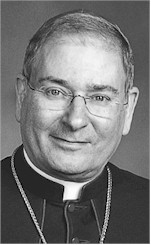 The out-going chairman of the bishops’ Committee on Divine Worship, Bishop Arthur Serratelli of Paterson, gave the following update to the USCCB today. Bishop Serratelli is now succeeded by the Archbishop of New Orleans, the Most Reverend Gregory M. Aymond. The USCCB press release is here.
The out-going chairman of the bishops’ Committee on Divine Worship, Bishop Arthur Serratelli of Paterson, gave the following update to the USCCB today. Bishop Serratelli is now succeeded by the Archbishop of New Orleans, the Most Reverend Gregory M. Aymond. The USCCB press release is here.
surfaced through some segments of the Catholic Press regarding the present
state of the text of the Roman Missal, Third Edition. A number of facts will
hopefully clarify the situation and, in so doing, give us the calm needed to
welcome and implement the new text.
genesis of the final text that is now being prepared for publication. The International
Commission on English in the Liturgy (ICEL) prepared for the English-speaking
Conferences of Bishops preliminary drafts (“green books”) of the 12 sections of
the Roman Missal. After incorporating the feedback and responses of the
individual Conferences of Bishops and the Vatican Congregation for Divine
Worship and the Discipline of the Sacraments, ICEL then prepared the final
drafts (“gray books”). These were approved by canonical vote by each of the
member Conferences. In approving the gray books, each conference also had the
opportunity to make further suggestions to the Congregation, as was done in
particular by our Conference. We submitted many amendments to the texts. The
Congregation, working with the Vox Clara Committee, carefully listened to what
the bishops said. The Congregation incorporated many of the suggestions of the
various Conferences (including our own), combined with their own review and
changes, and put forth the final text. The Congregation followed the principles
of Liturgiam Authenticam faithfully but not slavishly.
now being readied for publication. This process includes a final review and
copy edit which, given the size of the text, uncovers some minor questions of
consistency, typographical errors, and layout. Those questions are being
addressed by the Congregation for Divine Worship. This review has not dealt
with the translation itself. The critique that has circulated has necessarily
failed to take into account the final version of the text, which incorporates
some corrections issued by the Congregation since the transmittal of the full
text to the English-speaking Conferences of Bishops in August 2010.
there is a final text. It has received a recognitio. As the work of editing and
assembling nears completion, there is assurance that the published text will be
available in more than ample time for implementation in Advent 2011. It is good
to note also that the catechetical preparation for implementation is already
underway and has proceeded with much enthusiasm and wide acceptance by both
clergy and laity. It is clear at this point in time that there is an attitude
of openness and readiness to receive the new text. Let us pray in this time of
transition and change that the Roman Missal, Third Edition, will enable all to
understand more deeply the mysteries we celebrate.
